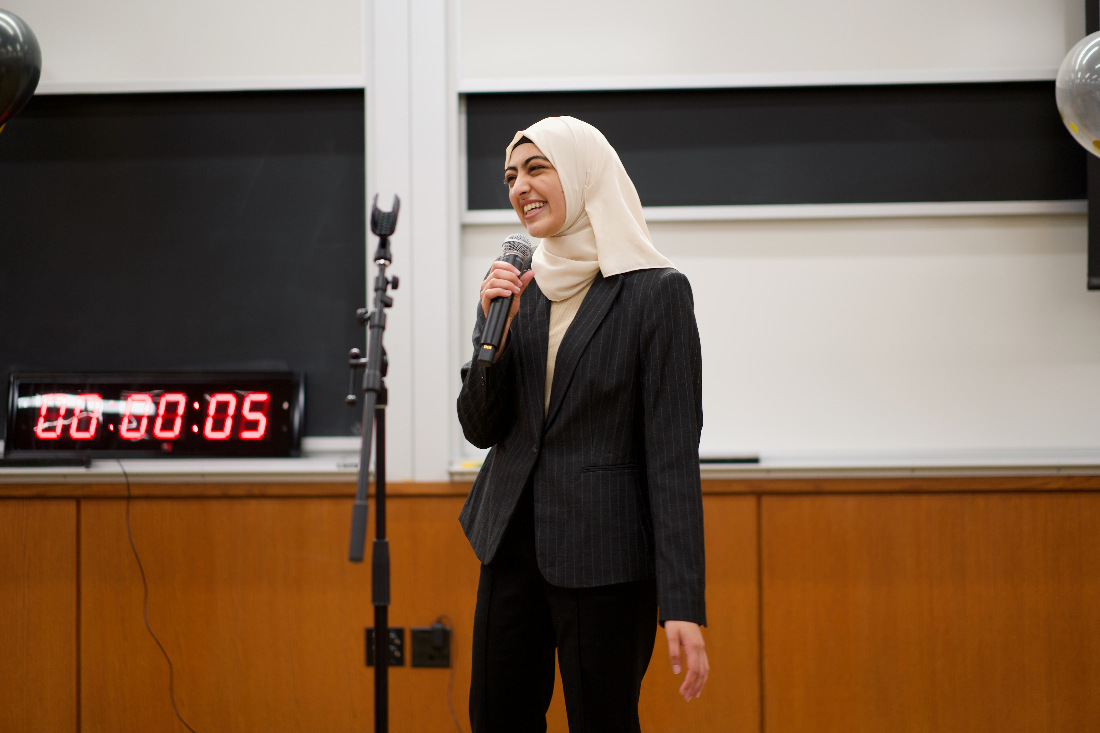Zarah Lakhani '24 presents at BC's 2022 Elevator Pitch Competition, where she won first place.
Zarah Lakhani ’24 Believes Health Should Be the Norm

One class really can change your life. For Zarah Lakhani, Lynch School of Education and Human Development '24, that class was Design for ImpACCt, a design-driven course which brings together students across four colleges in the Atlantic Coastal Conference to help solve real-world problems using human-centered, multi-perspective approaches. In the spring of 2022, Zarah enrolled, and was assigned to a group with Andrea Crewe, Boston College ’22, and Lindsey Dotson, North Carolina State ’22. Instead of simply fulfilling their class assignment, these three young women set out to solve a serious health problem: mold.
They were inspired by Lindsey’s roommate, who has an autoimmune disease brought on by prolonged exposure to black mold. A little research showed how far-reaching the problem is—70% of US homes have mold and 28% of the US population is genetically susceptible to mold-related health issues, from asthma to fertility problems. Yet, as Zarah explains, “Mold detection products are generally reactive; you see the mold and send it to a lab to test it. By then health consequences may have already occurred. We wanted a product that was proactive.” So, they went to work designing Spore, an in-home monitor that alerts users when mold spores are present. Then they started winning competitions.
.jpg)
Zarah Lakhani (second from right), Lindsey Dotson (left) and Andrea Crewe (second from left) present their pitch at the 2023 ACC InVenture Prize at Florida State University.
Perfecting the pitch
“At the end of the Design for ImpACCt class, we entered the Stanford Longevity Competition for fun. We were among eight semi-finalists and the only group chosen from the US,” Zarah recounts. “We won third place—and were connected to the JP Morgan entrepreneurship pitch.” That yielded excellent feedback—and the impetus to file as an LLC. Determined to tackle many health issues in the future, Zarah and her colleagues named their company Vitalti, with Spore as its first product. As the trio frequently say, “Health should not be a privilege, but a norm.” Their goal is to help that vision become a reality.
Last fall, they took part in the Shea Center Elevator Pitch Competition, hosted by Start@Shea. They won, gleaning $600 in prize money, and then moved on to Shea Center’s 9-week accelerator boot camp.
Most recently, the team represented BC in the 2023 ACC InVenture Prize competition, and won first place in the Shea Center’s Strakosch Venture Competition. Along the way they have collected mentors, advice, and prize money, all of which come in handy. “People don’t realize how expensive lab work is,” she says.
The start-up juggle
Of course, the start-up path hasn’t always been smooth. Zarah is studying Applied Psychology and Transformative Education, with a minor in Management and Leadership. As she notes, “That is very different from what I am doing at Vitalti. I experienced a lot of ‘imposter syndrome’ at the beginning. I’m young, I’m female. I’m a person of color. I wondered if [my co-founders’ and my] words were even being taken seriously.” She continues, “Now I realize that we are wanted. Boston College has provided a great network of alumni, who act as advisors. These people have lots of experience and good intentions for us and our company. We would not have been able to get as far as we have without them.”
As every entrepreneur knows, getting a start-up off the ground is a full-time, round-the-clock job. In addition to leading her new company, Zarah is working as a research assistant, serving as director of a club, and handling a five-class course load. “I want to take time out to see my family and my friends, but it’s hard to manage, I’m not going to lie.” She laughs. “Google Calendar is my best friend.” But she also recognizes the fortunate position she is in. “For student founders, it’s important to play into the advantages a college offers. I am so grateful that BC allows me to leverage this giant network of connections. I have constant meetings with mentors and advisors. I am always trying to push ahead, to take advantage of these resources while I have them. My co-founders both graduated and they have lost that support.”
Getting to launch
Vitaliti’s science leverages a study from New York University based on the same technology. Now they are building a prototype, which they hope to have completed this summer. They are also seeking a lab partner to pinpoint specifics, such as how many square feet one unit could cover, whether in a house, a dorm, or an apartment. With their marketing strategy, distribution strategy, and financial projections in hand, Zarah and her teammates are well on their way.


